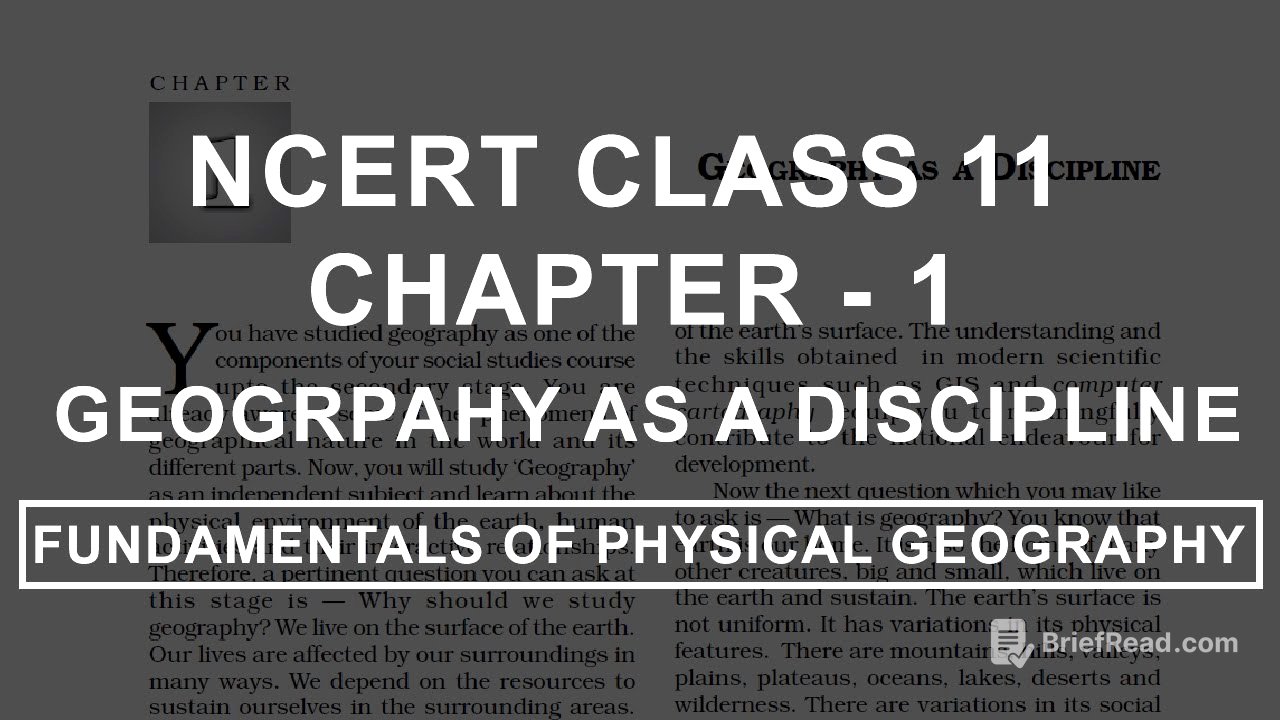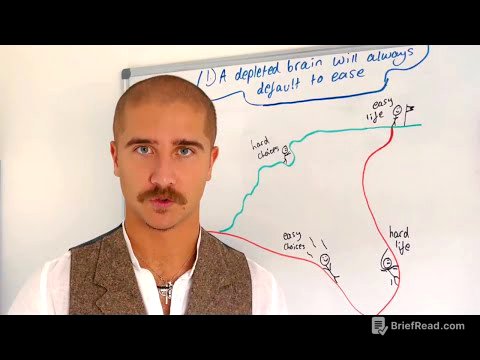TLDR;
This video provides an introduction to the first chapter of the NCERT Geography Class 11 textbook, "Fundamentals of Physical Geography," focusing on geography as a discipline. It explains the importance of studying geography, its meaning, and its relationship with both natural and social sciences. The lecture also covers key concepts such as the three sets of questions in geography (what, where, and why), geography as an integrating discipline, the significance of time in geographical studies, and the branches of geography, including physical and human geography.
- Importance of studying geography to understand the Earth's physical environment and human society.
- Geography as an integrating discipline that combines natural and social sciences.
- Key concepts: the three questions (what, where, why), dualism, and the relationship between physical and human geography.
Introduction to Geography [0:00]
The video starts by emphasizing the importance of studying geography because we live on Earth and need to understand our physical environment. Our lives are significantly influenced by our surroundings, with everything around us originating from natural resources. Geography teaches us how human society and the Earth have evolved over time, illustrating the changes in our food habits and clothing. Geography as a discipline helps us understand the changes that have occurred over time.
Meaning of Geography [1:02]
Geography is defined as the study of Earth, focusing on both its physical features (mountains, hills, valleys, plains, oceans, lakes, deserts) and human beings. Human society introduces variations in social and cultural forms, creating an interesting relationship between the physical environment and social or cultural features. The physical environment is like a stage, and human societies are the actors. This relationship is evident in architectural styles, food rituals, customs, and human behavior. The term "geography" was first coined by Eratosthenes, a Greek scholar, where "geo" means earth and "graphos" means description.
Geography and its Disciplines [2:31]
Geography includes many disciplines, such as natural science (geology, pathology, oceanography, botany, zoology, meteorology) and social science (economics, history, sociology, political science, anthropology). A geographer's work involves studying variations in the physical features of the Earth and understanding their association with other factors, such as the relationship between cropping patterns and factors like soil, climate, market demands, investment, and technological availability. Geographical phenomena are dynamic and change over time. Early human societies were directly dependent on nature for food, clothing, and shelter, while modern society uses technology to utilize natural resources. Technology has brought freedom, reduced labor harshness, increased labor efficiency, and provided leisure.
Geography as a Discipline [4:25]
Geography as a discipline is concerned with three sets of questions: what, where, and why. "What" refers to the relationship between natural and cultural features on Earth, or the relationship between humans and the land. "Where" refers to the distribution patterns of human culture and society on Earth. "Why" answers the causes and relationships between natural and human features, such as population distribution. These questions address the dynamic interaction between human beings and the physical environment.
Geography as an Integrating Discipline [5:42]
Geography is an integrating discipline that combines various fields to understand the world as a single entity. It integrates topics like distances, routes, transportation, technology, communication, economy, and population. Time is an integral part of geographical studies because every geographical phenomenon changes through time. Physical features like landforms, climate, vegetation, economic activities, and occupation change with respect to time. Time is used as a yardstick to measure these changes.
Physical Geography and Natural Sciences [7:59]
Physical geography is linked with natural sciences such as geology (study of landforms), meteorology (deals with climate), hydrology (deals with water bodies), and pedagogy (deals with soil). Biogeography is closely related to botany (study of plants) and zoology (study of animals). A geographer should be proficient in mathematics and arts to draw maps, which are essential in geography and have a strong relationship with latitudes and longitudes.
Geography and Social Sciences [9:44]
Understanding social sciences is equally important in geography. Disciplines under social sciences include sociology (study of human societies), political science (study of government and states), economics (deals with production, distribution, and consumption of goods and services), and demography (studies the characteristics of human population). Understanding these disciplines is important for understanding the territory, people, and sovereignty of a particular place.
Branches of Geography [11:47]
The various disciplines associated with geography are its branches. Alexander von Humboldt introduced the approach of considering both the natural and social aspects to understand geography. Dualism is a main characteristic of geography, referring to the theories of focusing solely on physical geography versus including human beings as an integral part of the Earth's surface. The branches of geography are systematically divided into physical geography (geomorphology, climatology, hydrology, soil geography) and human geography (social, population, economic, historical aspects). Biogeography, which includes plant and animal geography (botany and zoology), acts as an interface between physical and human geography.
Physical Geography and its Importance [15:17]
Physical geography deals with the physical features of the Earth, including the lithosphere (landforms), hydrosphere (water bodies), atmosphere (climate and weather), and biosphere (all life-forms). These elements are crucial for the survival of any organism on Earth. The study of physical geography is emerging as a discipline for evaluating and managing natural resources. There is a complementing relationship between the physical environment and human beings, which geography helps us understand.









